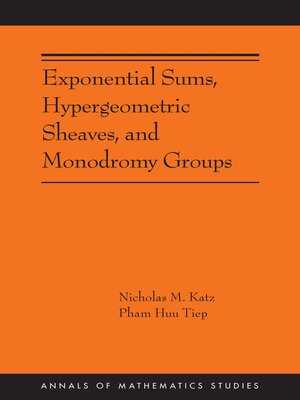Exponential Sums, Hypergeometric Sheaves, and Monodromy Groups
ebook ∣ Annals of Mathematics Studies
By Nicholas M. Katz

Sign up to save your library
With an OverDrive account, you can save your favorite libraries for at-a-glance information about availability. Find out more about OverDrive accounts.
Find this title in Libby, the library reading app by OverDrive.



Search for a digital library with this title
Title found at these libraries:
| Library Name | Distance |
|---|---|
| Loading... |
An examination of some of the remarkable connections between group theory and arithmetic algebraic geometry over finite fields
Exponential sums have been of great interest ever since Gauss, and their importance in analytic number theory goes back a century to Kloosterman. Grothendieck's creation of the machinery of l-adic cohomology led to the understanding that families of exponential sums give rise to local systems, while Deligne, who gave his general equidistribution theorem after proving the Riemann hypothesis part of the Weil conjectures, established the importance of the monodromy groups of these local systems. Deligne's theorem shows that the monodromy group of the local system incarnating a given family of exponential sums determines key statistical properties of the family of exponential sums in question. Despite the apparent simplicity of this relation of monodromy groups to statistical properties, the actual determination of the monodromy group in any particular situation is highly nontrivial and leads to many interesting questions.
This book is devoted to the determination of the monodromy groups attached to various explicit families of exponential sums, especially those attached to hypergeometric sheaves, arguably the simplest local systems on G_m, and to some simple (in the sense of simple to write down) one-parameter families of one-variable sums. These last families turn out to have surprising connections to hypergeometric sheaves. One of the main technical advances of this book is to bring to bear a group-theoretic condition (S+), which, when it applies, implies very strong structural constraints on the monodromy group, and to show that (S+) does indeed apply to the monodromy groups of most hypergeometric sheaves.







